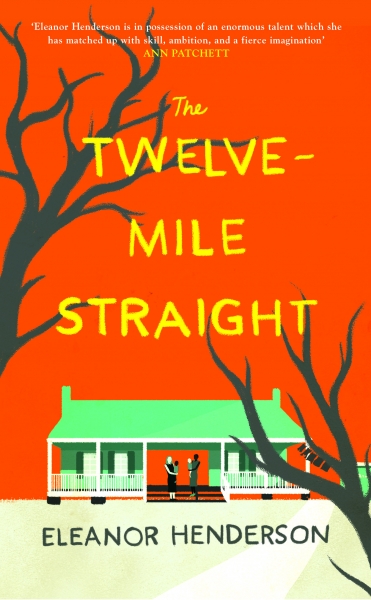The Twelve-Mile Straight
By eleanor henderson

Blurb
In a small town in rural Georgia, two babies are born - one light skinned and one dark. Their mother, Elma Jessop is a white sharecroppers daughter and the birth of her children causes a scandal in the town because her father, Juke, claims Elma was raped. This claim leads to the lynching of a field hand by the name of Genus Jackson and the unravelling of a whole load of secrets in the house in which the babies were born.
Our Review
Twelve-Mile Straight by Eleanor Henderson reminded me of To Kill A Mockingbird because it was less about the crime that occurred and more about race and relationships in a small Southern town.
Florence is a small town in rural Georgia much like any other town and wholly unremarkable until the ‘Gemini twins’ are born - to Elma Jessop is a white sharecroppers daughter.
The birth of the twins causes a scandal in town because one twin is light skinned and one is dark but also because her father, Juke, claims Elma was raped. This claim leads to the lynching of a field hand by the name of Genus Jackson and the unravelling of a whole load of secrets in the house in which the babies were born.
“Genus Jackson was killed in Cotton County, Georgia, on a summer midnight in 1930, when the newborn twins were fast asleep…like two halves of the single eggshell from which they’d hatched. Only if you looked closely – and people did – could you see that the girl was pink as a piglet, and the boy was brown.”
Elma’s fiancé Freddie Wilson, grandson to their landlord George Wilson, is suspicious of Elma’s original claim that it is probably some Indian blood somewhere in her family tree that is showing through. He takes his worries to Elma’s father.
Juke claims that Elma was raped by Genus and Freddie, Juke and three other trucks full of men set out to confront Genus who denies it adamantly to no avail.
“Freddie looped another rope over one of the crossbeams and the noose around Genus’ neck…Genus dropped, his neck snapping like a chicken’s.”
Juke cut the body down but Freddie then decided to parade it through down dragging down the Twelve-Mile Straight behind his truck. He was accompanied by many men that night each of whom swore to be asleep in bed when questioned later.
After the lynching reporters descend on the small mill town interested in both the lynching and in the Gemini Twins. Elma has to learn to struggle with her feelings over her part in the lynching and also to raise the twins without the help of her mother who had herself died in childbirth.
Elma’s one consolation is the presence of her friend Nan. Nan is the daughter of former field hand Sterling and his wife Ketty who was a midwife before he death.
Ketty cut Nan’s tongue out when she was still a small child but despite this Elma and Nan have developed a strong friendship. Part of this friendship developed from Juke allowing Nan to live in ‘the big house’ with them, an action that has lead some in town to label him a ‘nigger lover.’
For Elma, Nan is part of her family. Now that Nan slept in the in the big house – well, if they weren’t sisters, what were they?
How Nan feels about Elma is often a bit more ambiguous, it is clear to the reader that she is comforted by her presence, but she also feels as if she doesn’t really know her and because of her inability to talk there is often cause for the reader to wonder if other characters are projecting thoughts onto her.
“Too often her silence is mistaken for objection. Too often her silence is mistaken for assent.”
I found it difficult to read some of the examples of casual racism in the book let alone the more overt examples. I think that is part of the what makes the book interesting though – it challenges the reader.
I initially found it hard to see why so many people believed that the ‘Gemini twins’ were just that but a passage in the book explains why this was the case.
“They believed that the babies were twins. Because if they didn’t believe, then they didn’t believe Genus Jackson was one of the daddies. They’d have to believe that the daddy was someone else. They’d have to believe that a mob of white men killed a black man for no reason. And they couldn’t believe that.”
This wilful denial was something that occurs continuously in the book and across a variety of topics.
This book took me a fair amount of time to read and was definitely slow going but I can’t say I didn’t enjoy it. It was nice to read a book that I could take my time with.
Our Final Rating...
Read & Shared 74 Times.



Get In Touch
Please feel free to leave a comment to this book review below. Or even leave your own review if you like.
If you run a blog and/or have posted a review to this book, a Q & A or general author interview online you can always add a trackback to it here and following moderation we'll add a link to it below.